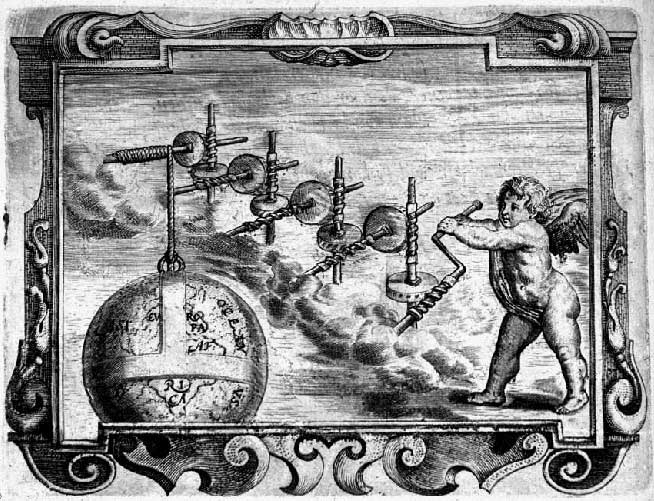

| Virtual standpoints: the power of outlandishness.
From Johannes Bolland, Imago primi saeculi Societatis Iesu (Antwerp,
1640; also issued that year in a Flemish paraphrase as Af-Beeldinghe van d'eerste eevwe der Societeyt Iesv), Emblem 3.5 (Regnorum & Prouinciarum per Societatem conuersio, "The Conversion of Realms and Provinces by the Society"): |
| Fac pedem figat, & terram mouebit. Parue puer, maiora tuis quid viribus audes? Demens! non illâ est terra mouenda manu. Risit; &, Hoc, inquit, fac pes consistat inani, Mutabit medium pendula terra locum. Illa quidem stat mole suâ, libratáque magni Arte Dei; nostris sed superanda rotis. Nempe vbi vim totam rota versa coëgit in vnum, Protinus appensum machina tollit onus. Hoc quodcumque vides, Loiolae sacra propago, Quà vagus immensam Nereus ambit humum, Quà Phoebi radios vltra iacet abdita tellus, Virtutis spatium est metáque tota tuae. Hîc fortem quacumque pedem defigis, in altum Cuncta, graui quamuis mole premantur, agis. Testis eris concussa tuis America Regnis, Paenè tuo in Stygios pondere mersa lacus; Sed validâ subducta manu pallentibus vmbris, Caepisti ignoti tecta subire poli. Testis & Europe, medio'que coërcita ponto Africa; & haec tenebris vtraque mota suis. Vltima quin adeò nascentis limina Phoebi, Vidimus hac etiam contremuisse manu. Ima licet vastae subsidant pondera terrae, Euehet ad Superos ingeniosus amor. |
Give him a place to stand, and he will move the world [trans. DK]
Little boy, why attempt things too great for your strength? You fool! Earth is not going to give way to that hand. He said laughingly, "Let me stand here in this void and watch me make the hanging world alter its center. It stays equipoised, balanced by way of almighty God's art, but outmatched by our wheels; for a wheel with its turn concentrates all the force, and the engine directly draws up the hitched load." Every place you see here, holy brood of Loyola, wherever sea ranges around the broad earth, and lands lurk far-flung even beyond the sun's rays, this is all the arena and goal for your strength; here wherever you plant your strong foot, you draw all up, no matter how gravely weighed down. Of this you're proof, America, wrenched from self-rule, by your own weight almost overwhelmed in Hell's deep, but drawn up by strong hand from shades pallid with fright you've begun to ascend to unknown Heaven's heights. Europe, you're a proof, too, and you, Africa, forced in mid-sea, each of them also stirred from their darkness; and indeed we have last seen the burgeoning sun's very threshold as well shake beneath this same hand. Though the massy world's bulk should sink low, heavenward it will climb by Love's art. |
Geeft my waer staen, / Ick sal't doen gaen. Wel, wat doet hier dit kleyne kindt, Dat heel de werelt opwaerts windt? Ey lieuen soetaert, rust doch wat, Wat doedy met soo menigh rat? V handt en vinghers zijn te teer, Van nu af sie ick daer een weer, En hier en daer het vel af gaen; De werelt sal doch blijuen staen. Den ionghen blift al euen trots, En euen steegh ghelijck een rots, En draeyt, en wendt het al om hoogh; Sou ouck wel missen hier mijn oogh? Siet, al dit groot en swaer ghewicht, Het wort ghelijck een pluym soo licht, Het gheen' dat eertijts onder lagh, Begint nu oock te sien den dagh, Begint nu oock al wat te zijn, Door eenen nieuwen sonnen-schijn. Nu staet heet kindt met my en lacht; Wat dunckt v, vriendt, van dese kracht? Dat ick hier doe, en is maer spel, Maer komt wat by, en merckt het wel. De werelt eerst vry al te leegh En kreegh gheen Godtlijk licht te deegh, Sy lagh daer diep in kettery, Noch dieper in afgodery. Den goeden Godt, maer t'saemen sterck, Die stelt sijn rechte handt te werck En neemt dit aerdigh instrument, Thien raederkens oft daer omtrent, De Compagnie een kleyn beghin Die spant hy door sijn gracy in, En wendt de werelt soo om hoogh, Dat 'tmeeste deel nu stet in't droogh. Dat tuyght ons Iapan op-ghewendt, Aen wie 'tgheloof waes onbekent: En den Chinois, en Indiaen Die naerder nu den hemel staen. Gheen landt soo verr' uyt ons ghesicht, Of't wordt hier t'samen op ghelicht. |
| Image reproduced by permission of the Houghton Library, Harvard University; transcripts based on the copies in the Georgetown University Library. The conceit and the motto are taken from Archimedes' purported saying "Give me a long enough lever and a place to stand and I will move the world"; in the seventeenth century it was easy to sense just such virtual leverage at work in the growing importance of outlying nations like England. See Marvell, "The First Anniversary [1654] of the Government under O[liver] C[romwell]" 99-100, and Waller, "To the King [Charles II], upon his Majesty's Happy Return" 51-54. |